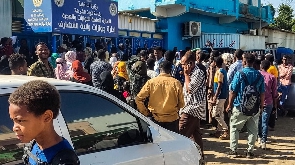 People displaced by the conflict in Sudan gather outside a passport office in the city of Gedaref
People displaced by the conflict in Sudan gather outside a passport office in the city of Gedaref
Sudan’s conflict could face the risk of being ‘forgotten’ by the international community, even as US lawmakers singled out the United Arab Emirates (UAE) for fanning rebels.
Alice Nderitu, the UN Special Adviser on the Prevention of Genocide says in her latest situational update that there has to be pressure on warring sides -- the Sudan Armed Forces (SAF) and the Rapid Support Forces (RSF) to end the violence that has seen at least 12,000 people killed so far.
The RSF launched the war on SAF on April 15 in Khartoum. But the conflict has since expanded countrywide, seeing at least 5.6 million people internally displaced and another 1.4 million rendered refugees in neighbouring countries.
Ms Nderitu, in her December update, says there is a dangerous sign the violence would continue to churn out civilian victims unless Sudan’s allies act fast.
“The world must respond to the horrors of what is happening in Sudan. The terror and vicious violence already inflicted on entire populations, simply because of who they are, display the crudest of terms what will continue happening unless urgent international attention is brought upon this situation,” she said in a December 21 update.
“The situation in Sudan cannot, must not, become a forgotten crisis.”
Sudan’s war has recently followed ethnic lines and a group of US lawmakers last week accused the UAE of frustrating peace talks Washington has been leading alongside Saudi Arabia and the regional bloc Intergovernmental Authority on Development (Igad), known as the Jeddah Process.
“Most importantly, we are concerned that the UAE is at odds with the efforts of Sudanese civilians, the region, and the broader international community to stop the fighting,” they wrote in a joint letter on December 19 to Emirati Foreign Minister Sheikh Abdullah Zayed al Nahyan.
The lawmakers led by Ms Sara Jacobs, Ranking Member for the Subcommittee on Africa, House Foreign Affairs Committee and Barbara Lee, Ranking Member for the State, Foreign Operations and Related Programmes Subcommittee of the House Appropriations Committee said they have “concern with the United Arab Emirates’ support to the Rapid Support Forces in Sudan and urge the UAE to reconsider its policy towards Sudan.”
Others included Jason Crow, Colin Allred, Joaquin Castro, James P McGovern, Sheila Cherfilus-McCormick, Dina Titus, Sydney Kamlager-Dove and Dan Kildee.
The UAE has not responded publicly to the letter but has in the past expressed reservations about a peace deal that potentially allows Omar al-Bashir era leaders back into government, something seen as a block on any transition to democracy.
Rights groups had said the UAE was fanning RSF violence by supplying arms through Chad, something Abu Dhabi had previously denied. The US lawmakers warned such a provision would be a violation of a UN arms embargo on Darfur which “would be a grave reputational risk for the UAE and put the longstanding close partnership with the United States into question.”
War crimes:
The RSF, an offshoot of militia known as Janjaweed that meted out violence in Darfur more than 20 years ago, has also been accused of committing crimes against humanity and ethnic cleansing, while both RSF and SAF are accused of war crimes.
On December 6, US Secretary of State Antony Blinken determined that members of the RSF and SAF have committed war crimes in Sudan and that the RSF and allied militias have committed crimes against humanity, including murder, rape, and other forms of sexual violence, deportation or forcible transfer, and persecution, and are responsible for ethnic cleansing in Darfur.
Washington says this categorisation is “a necessary step toward accountability for survivors and victims of this and previous conflicts in Sudan.”
But Sudan’s warring sides have been unable to agree or uphold any ceasefire since the war began in April. The Jeddah Process has struggled to enforce any agreed pointers including one-on-one meetings between ringleaders of the war.
Now the UN estimates that as many as 250,000 to 300,000 civilians have fled the Wad Madani area, some 300km south of Khartoum after RSF expanded its violence in neighbouring al-Jezira state.
RSF leader Mohamed Hamdani Daglo last week refuted renewed violence as a further blow to the peace bid. Instead, he said the battle reflected RSF's determination to end Bashir-era autocracy.
“We call on the members of the international community, particularly the friends of Sudan from neighbouring countries, significant transformations occurring in Sudan today as a positive opportunity for change to building a genuine democratic State in Sudan, where government truly is of the people, by the people, and for the people,” Daglo said.